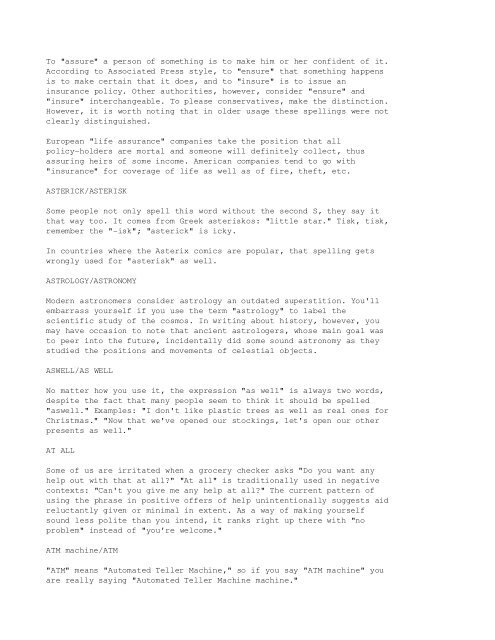Common_Errors_in_English_usage
Common_Errors_in_English_usage
Common_Errors_in_English_usage
Create successful ePaper yourself
Turn your PDF publications into a flip-book with our unique Google optimized e-Paper software.
To "assure" a person of someth<strong>in</strong>g is to make him or her confident of it.<br />
Accord<strong>in</strong>g to Associated Press style, to "ensure" that someth<strong>in</strong>g happens<br />
is to make certa<strong>in</strong> that it does, and to "<strong>in</strong>sure" is to issue an<br />
<strong>in</strong>surance policy. Other authorities, however, consider "ensure" and<br />
"<strong>in</strong>sure" <strong>in</strong>terchangeable. To please conservatives, make the dist<strong>in</strong>ction.<br />
However, it is worth not<strong>in</strong>g that <strong>in</strong> older <strong>usage</strong> these spell<strong>in</strong>gs were not<br />
clearly dist<strong>in</strong>guished.<br />
European "life assurance" companies take the position that all<br />
policyholders are mortal and someone will def<strong>in</strong>itely collect, thus<br />
assur<strong>in</strong>g heirs of some <strong>in</strong>come. American companies tend to go with<br />
"<strong>in</strong>surance" for coverage of life as well as of fire, theft, etc.<br />
ASTERICK/ASTERISK<br />
Some people not only spell this word without the second S, they say it<br />
that way too. It comes from Greek asteriskos: "little star." Tisk, tisk,<br />
remember the "isk"; "asterick" is icky.<br />
In countries where the Asterix comics are popular, that spell<strong>in</strong>g gets<br />
wrongly used for "asterisk" as well.<br />
ASTROLOGY/ASTRONOMY<br />
Modern astronomers consider astrology an outdated superstition. You'll<br />
embarrass yourself if you use the term "astrology" to label the<br />
scientific study of the cosmos. In writ<strong>in</strong>g about history, however, you<br />
may have occasion to note that ancient astrologers, whose ma<strong>in</strong> goal was<br />
to peer <strong>in</strong>to the future, <strong>in</strong>cidentally did some sound astronomy as they<br />
studied the positions and movements of celestial objects.<br />
ASWELL/AS WELL<br />
No matter how you use it, the expression "as well" is always two words,<br />
despite the fact that many people seem to th<strong>in</strong>k it should be spelled<br />
"aswell." Examples: "I don't like plastic trees as well as real ones for<br />
Christmas." "Now that we've opened our stock<strong>in</strong>gs, let's open our other<br />
presents as well."<br />
AT ALL<br />
Some of us are irritated when a grocery checker asks "Do you want any<br />
help out with that at all?" "At all" is traditionally used <strong>in</strong> negative<br />
contexts: "Can't you give me any help at all?" The current pattern of<br />
us<strong>in</strong>g the phrase <strong>in</strong> positive offers of help un<strong>in</strong>tentionally suggests aid<br />
reluctantly given or m<strong>in</strong>imal <strong>in</strong> extent. As a way of mak<strong>in</strong>g yourself<br />
sound less polite than you <strong>in</strong>tend, it ranks right up there with "no<br />
problem" <strong>in</strong>stead of "you're welcome."<br />
ATM mach<strong>in</strong>e/ATM<br />
"ATM" means "Automated Teller Mach<strong>in</strong>e," so if you say "ATM mach<strong>in</strong>e" you<br />
are really say<strong>in</strong>g "Automated Teller Mach<strong>in</strong>e mach<strong>in</strong>e."





